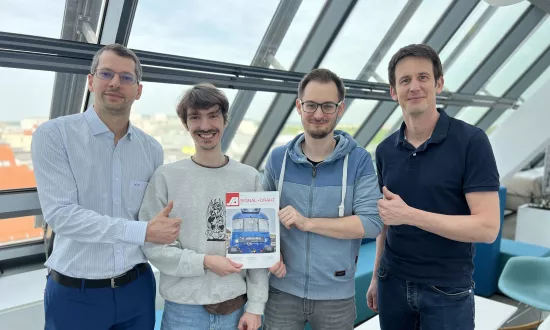The Journey of a STEM graduate in the Rail Industry
Technology touches upon every aspect of modern life and the need for young people to enter STEM industries has never been greater.
Software Engineer James Branton gained early work experience in a STEM industry through a Thales undergraduate placement and believes in the importance of introducing young people to the career possibilities when they choose to study and work in STEM subjects.
James’ first exposure to working in a STEM environment was an industry placement at Thales in 2010 as a computer science undergraduate at York University.
“I looked at about 20 plus companies that were part of a sandwich course scheme,” recalled James, “but what made Thales stand out for me was the practical side of what they were doing, touching the everyday lives of millions of people.”
“It was my first proper job in industry, and I was working on a team that delivered for real customers, not a bespoke internal project. I was thrown in at the deep end, but someone had clearly worked out where I’d thrive, and I got lots of support. I would ask lots of questions and my team would always help me so I probably learned more in that particular role than in three years of study.”
During his 12-month placement, James worked as a Software Engineer, developing National Rail Enquiries’ Online Journey Planner (OJP) as well as an application to manage staff travel cards for rail industry employees.
Soon after returning to York, James was offered a permanent post, joining Thales’s Cheadle site in Greater Manchester after he graduated in 2012. He entered the engineering stream of Thales’s graduate programme, re-joining the OJP team to continue developing web and mobile applications to supply real-time journey planning information for Britain’s travelling public.
He then worked on the National Traffic Information Service project for Highways England, which gathered data from tens of thousands of sensors to build a picture of the UK’s strategic road network.
A particular highlight for James was working on London Underground’s 4LM project, Thales in the UK’s largest transport project to date, modernising four of London Underground’s lines with new signalling technology.
James progressed from team member to leader, becoming the DevOps technical lead across Thales transport in the UK, working with a team of engineers on software projects across the country.
He has now taken on more responsibility as the Chief Product Owner role within the newly formed Manchester Digital Competency Centre (DCC). The DCC uses different tools, methods and technology to work with customers, understand their problems and come up with innovative digital solutions.
“It’s a really exciting time, setting up a small unit of Thales with a ‘start-up culture’ where we’re not afraid to work in novel ways, enabling us to push the boundaries and try new ideas.” said James.
Looking back, James remembers the importance of his early work experience; he was recently involved in a ‘hackathon’ event in Manchester to promote STEM careers for GCSE students, setting challenges and visiting schools to work with teenagers in solving them.
“My year in industry taught me that there’s no substitute for practical experience,” said James. “I wasn’t sure what I wanted to do after school, so I chose a sandwich course because it was important for me to see what it was like in the industry.”
“You don’t have to look far to see that everything in the world is driven by technology. We need more people to continue pushing the boundaries of technological innovation and coming up with new solutions, and we need to get them involved as early as we can.”


